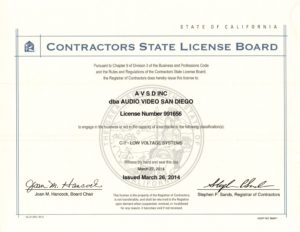
Audio Video San Diego is a licensed, bonded, insured contractor. Whether you use our services or a competitor we want you – the neighbors in our community – to understand the importance of hiring a legitimate licensed contractor.
C-7 Low Voltage Systems Contractor
This is the type of license someone must have in order to install a TV or sound system in your home.
In California, anyone who contracts to perform work on a project that is valued at $500 or more for combined labor and materials costs must hold a current, valid CSLB License. You can verify the license or call (800) 321-CSLB (2752). AVSD CA Lic# 991656
A communication and low voltage contractor installs, services and maintains all types of communication and low voltage systems which are energy limited and do not exceed 91 volts. These systems include, but are not limited to telephone systems, sound systems, cable television systems, closed-circuit video systems, satellite dish antennas, instrumentation and temperature controls, and low voltage landscape lighting. Low voltage fire alarm systems are specifically not included in this section.
![]() Be advised that unlicensed individuals pose a risk to your financial security if a worker is injured while on your property, your property is damaged, or if the work is incomplete and/or faulty. Few, if any, unlicensed individuals have a bond or workers’ compensation insurance. The quality of their work usually doesn’t compare to that of a licensed contractor. Don’t take the chance in order to save a few dollars. You’ll probably end up paying more in the long run.
Be advised that unlicensed individuals pose a risk to your financial security if a worker is injured while on your property, your property is damaged, or if the work is incomplete and/or faulty. Few, if any, unlicensed individuals have a bond or workers’ compensation insurance. The quality of their work usually doesn’t compare to that of a licensed contractor. Don’t take the chance in order to save a few dollars. You’ll probably end up paying more in the long run.
![]() When the contractor comes to your house to give you a bid, ask to see his/her pocket license, along with a picture I.D. Make sure the person you’re dealing with is the same person on the license.
When the contractor comes to your house to give you a bid, ask to see his/her pocket license, along with a picture I.D. Make sure the person you’re dealing with is the same person on the license.
![]() Contractors are required to have their license number on their business card and on all bids and contracts. Seeing a license number doesn’t necessarily mean the license is valid. Check the license status. Although an unlicensed operator may give you a low bid, the risks of possible financial and legal consequences outweigh any benefits a lower bid may seem to offer.
Contractors are required to have their license number on their business card and on all bids and contracts. Seeing a license number doesn’t necessarily mean the license is valid. Check the license status. Although an unlicensed operator may give you a low bid, the risks of possible financial and legal consequences outweigh any benefits a lower bid may seem to offer.
![]() In California, if a contractor has employees, he/she is required to carry workers’ compensation insurance. If a worker is injured working on your property and the contractor doesn’t have insurance, you could be financially liable to pay for injuries and rehabilitation. Your homeowner’s insurance may or may not cover those costs.
In California, if a contractor has employees, he/she is required to carry workers’ compensation insurance. If a worker is injured working on your property and the contractor doesn’t have insurance, you could be financially liable to pay for injuries and rehabilitation. Your homeowner’s insurance may or may not cover those costs.
![]() Licensed contractors are required to have a contractor license bond of $15,000.
Licensed contractors are required to have a contractor license bond of $15,000.
The National Electric Code (NEC) states:
NED Article 400: Flexible Cords and Cables General
400.8 Uses Not Permitted.
Flexible cords and cables shall not be used for the following:
(1) As a substitute for the fixed wiring of a structure
(2) Where run through holes in walls, structural ceilings, suspended ceilings, dropped ceilings, or floors
(3) Where run through doorways, windows, or similar openings
(4) Where attached to building surfaces
Exception: Flexible cord and cable shall be permitted to be attached to building surfaces in accordance with the provisions of 368.8.
(5) Where concealed by walls, floors, or ceilings or located above suspended or dropped ceilings
In other words, running power cords through the walls is not a substitute for permanent wiring. You’re supposed to have a new electric socket installed directly behind the TV, where you can plug in the power cord and coil up the slack to tuck underneath.
If you drilled some holes and ran cable yourself or the non-licensed person ran them in and back out to a power socket, chances are you are in violation of these codes. Should a fire result, your insurance may find reason to get out of covering your losses.